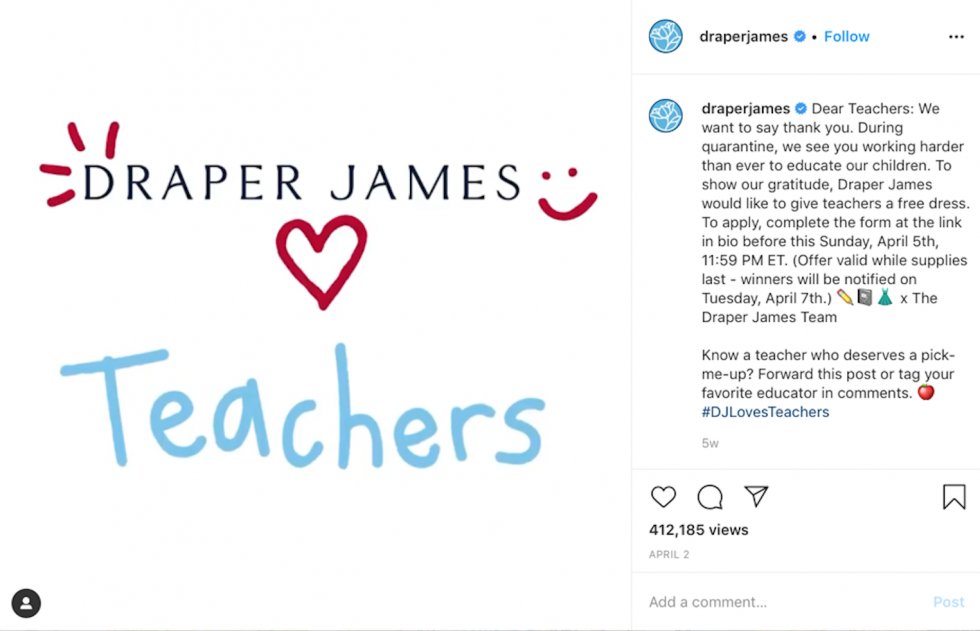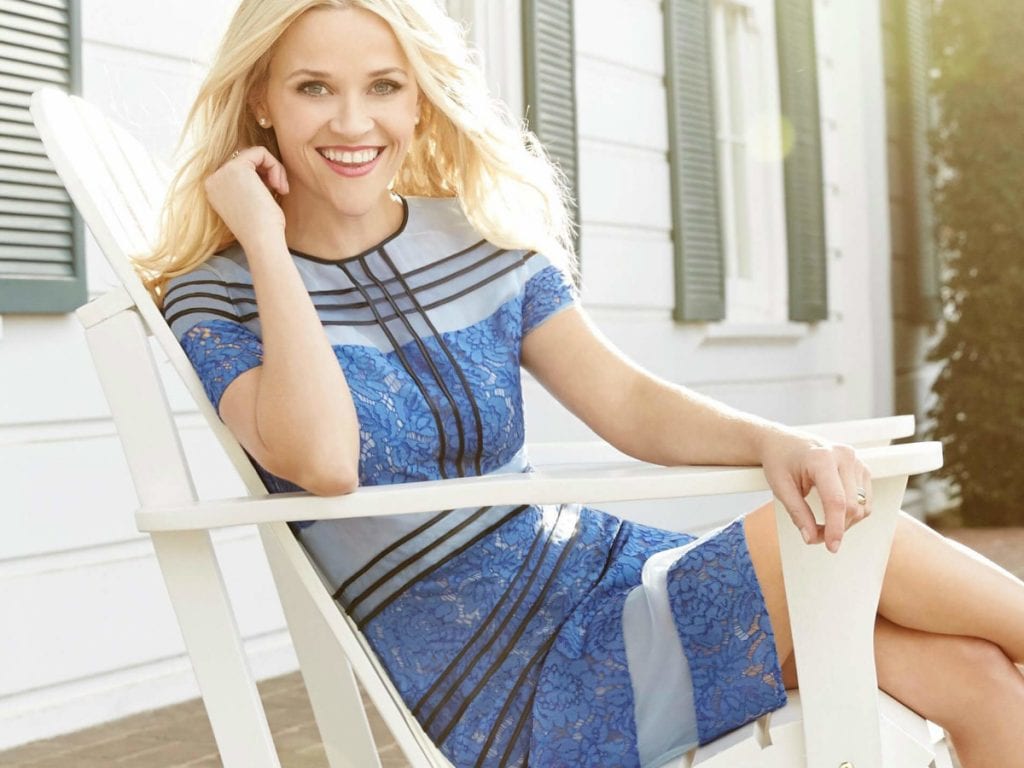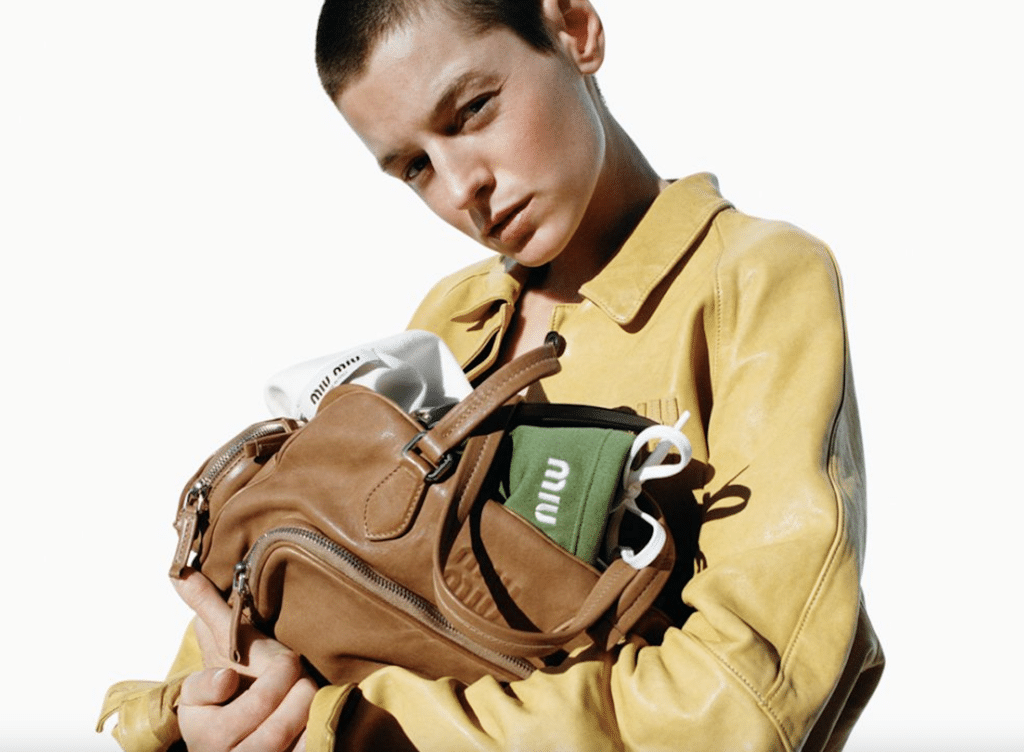Reese Witherspoon and her brand Draper James engaged in a “systemic marketing and promotion … scam,” according to a lawsuit that was filed against them this spring and recently removed to federal court in California. According to the proposed class action lawsuit that Laryssa Galvez, Judith Lindley and Natalie Anderson filed on behalf of themselves and as many as a million other similarly-situated individuals, Witherspoon and Draper James did not merely anger hundreds of thousands of teachers in connection with a recent dress giveaway-done-wrong, they ran also afoul of the law.
Setting the stage for their multi-million dollar lawsuit, Galvez, Lindley and Anderson (the “plaintiffs”) assert that Witherspoon and her 7-year old fashion and lifestyle brand Draper James “took advantage of the COVID-19 pandemic” and used it as an opportunity to “save hundreds of thousands, if not millions, of dollars in marketing costs,” while building up a database of valuable consumer information.
To be exact, the plaintiffs allege that in an Instagram post in March, Draper James announced that it would celebrate teachers during the global health pandemic by “providing dresses for [those] who signed up [for the giveaway] and provided their personal contact information – such as their teacher ID information, their teacher work email addresses, and even copies of their work employee badges – all highly sensitive information that could be exploited by cyber-criminals, or used or sold by the defendants (which, it turns out, they did).”
The giveaway went south almost immediately. “Upon receipt of close to a million” entries from teachers across the U.S., Draper James “suddenly renounced its offer,” and alerted consumers that the giveaway was actually a giveaway at all, and instead, it was “a lottery drawing.” Galvez, Lindley and Anderson assert that it would soon be revealed that the “while supplies last” language that was included in Draper James’ initial giveaway announcement actually meant that the brand had just 250 dresses to giveaway. In virtually no time at all, Draper James’ Instagram account was flooded with comments from dismayed teachers.
The once-exciting giveaway had swiftly turned into a social media disaster, with Instagram users expressing anger about the “misleading” giveaway and the brand’s “poor communication.” Others accused the brand of engaging in a “deliberate stunt designed to capture [entrants’] email addresses.”
Instead of moving on from the giveaway-turned-lottery, the plaintiffs decided to file suit, alleging that by entering into the giveaway and providing Draper James with their information, a contract was formed, and when they did not receive their dresses, Draper James breached that contract. Galvez, Lindley and Anderson argue that “based on the significant public reaction and outcry from the victims of this scam, there is clear and positive evidence that the plaintiffs and [the potential] class members” – a pool of as many as a million others that entered the giveaway – “reasonably would have concluded that by acting in accordance with the defendants’ requests, a contract would be formed between the parties.”

“In response to [Draper James’] representations and omitted material facts,” namely, the fact that the brand had 250 (and not a million) dresses to give away, “consumers provided their sensitive personal employment information and copies of their employee IDs to Draper James,” which they claim has enabled the brand to “exponentially increase the size and value of their customer marketing database in ways that saved them hundreds of thousands, if not millions, of dollars in marketing costs over the amount they would have had to expend to obtain such information absent this offer, and the ability to exploit or sell this new data base for access to others.”
The plaintiffs go on to claim that the information they provided to Draper James “is of independent value, with initial estimates as low as 50 cents to $5 per name in a commercial database, depending on the amount and quality of information available, and the demographics of the clients on a customer database.” By almost immediately making use of the information and sending giveaway entrants “promotion and discount offer” emails, Draper James allegedly demonstrated “the independent value [of the information].”
Ultimately, Galvez, Lindley and Anderson assert that they would not have signed up for the giveaway nor would they have provided Draper James with their information “had they known they were not actually getting a Draper James dress, but instead, [were] being entered into a lottery with a less than 0.00025% chance of ‘winning’ and would thereafter be bombarded with promotional offers that, even if accepted, would make [Draper James] even more money.”
With that in mind and given that they claim that they “now face a credible threat of real and immediate harm stemming from the defendants requiring them to provide unnecessary information as a prerequisite to entering into this transaction,” namely, “increased risk of identity theft or fraud,” the plaintiffs claim that Draper James and Witherspoon are on the hook for breach of contract, promissory estoppel, unjust enrichment, and an array of California civil code violations.
In addition to seeking class action certification to enable others who signed up for the giveaway to join in any potential settlement or damages away, and monetary damages, the plaintiffs have “requested that. pursuant to the applicable provisions of state and federal privacy laws, [Draper James] agree to immediately stop using or selling [all personally identifying information that was gathered in response to the giveaway], and segregate, take off servers, and encrypt it so as to ensure that it is not subject to cyber-attack or breach.” The plaintiffs state that Draper James has “not publicly stated whether it is willing to do so.”
In a statement provided to Law360, counsel for Draper James said that the case is an “unjust attempt to exploit Draper James’ good intentions to honor the teacher community by gifting hundreds of free dresses,” further noting that “the fact that supplies were limited, such that a free dress could not be provided to every teacher who responded, was disclosed and is no basis for a lawsuit.”
*The case is Laryssa Galvez, Judith Lindley and Natalie Anderson v. Draper James and Reese Witherspoon, 2:20-cv-04976 (C.D.Cal).











